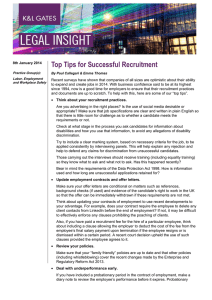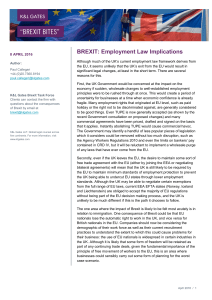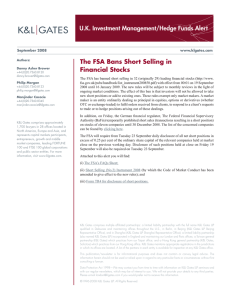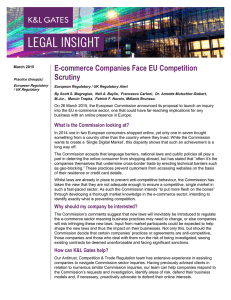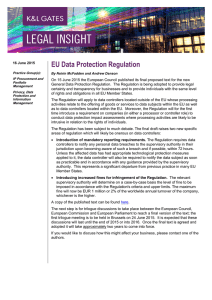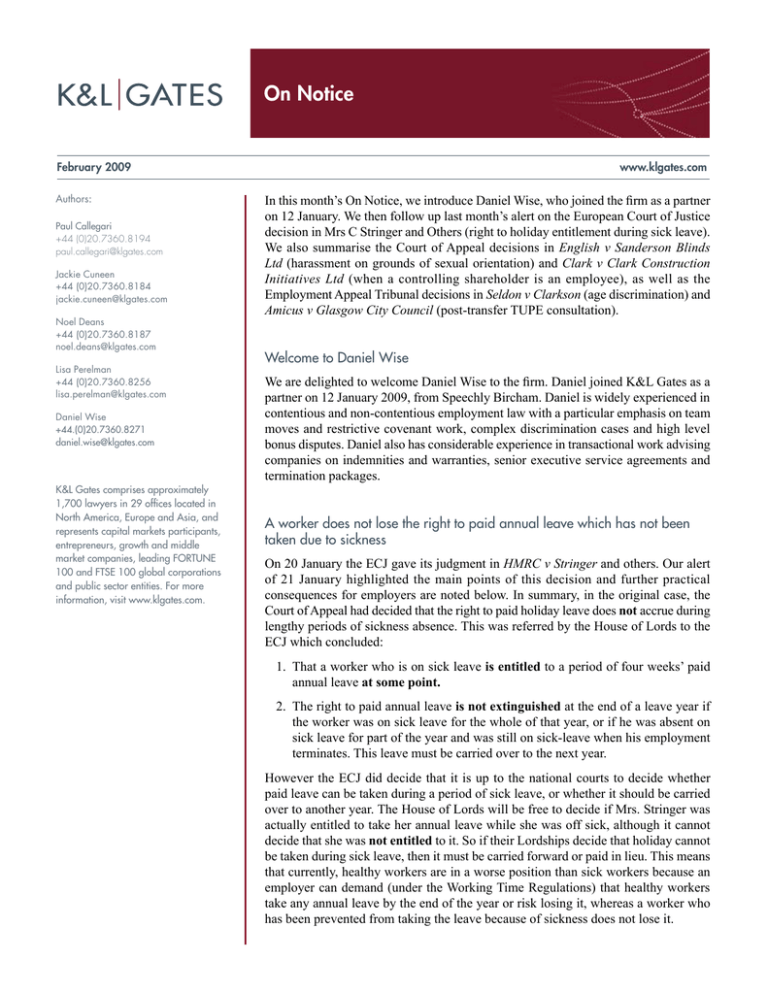
On Notice
February 2009
Authors:
Paul Callegari
+44 (0)20.7360.8194
paul.callegari@klgates.com
Jackie Cuneen
+44 (0)20.7360.8184
jackie.cuneen@klgates.com
Noel Deans
+44 (0)20.7360.8187
noel.deans@klgates.com
Lisa Perelman
+44 (0)20.7360.8256
lisa.perelman@klgates.com
Daniel Wise
+44.(0)20.7360.8271
daniel.wise@klgates.com
K&L Gates comprises approximately
1,700 lawyers in 29 offices located in
North America, Europe and Asia, and
represents capital markets participants,
entrepreneurs, growth and middle
market companies, leading FORTUNE
100 and FTSE 100 global corporations
and public sector entities. For more
information, visit www.klgates.com.
www.klgates.com
In this month’s On Notice, we introduce Daniel Wise, who joined the firm as a partner
on 12 January. We then follow up last month’s alert on the European Court of Justice
decision in Mrs C Stringer and Others (right to holiday entitlement during sick leave).
We also summarise the Court of Appeal decisions in English v Sanderson Blinds
Ltd (harassment on grounds of sexual orientation) and Clark v Clark Construction
Initiatives Ltd (when a controlling shareholder is an employee), as well as the
Employment Appeal Tribunal decisions in Seldon v Clarkson (age discrimination) and
Amicus v Glasgow City Council (post-transfer TUPE consultation).
Welcome to Daniel Wise
We are delighted to welcome Daniel Wise to the firm. Daniel joined K&L Gates as a
partner on 12 January 2009, from Speechly Bircham. Daniel is widely experienced in
contentious and non-contentious employment law with a particular emphasis on team
moves and restrictive covenant work, complex discrimination cases and high level
bonus disputes. Daniel also has considerable experience in transactional work advising
companies on indemnities and warranties, senior executive service agreements and
termination packages.
A worker does not lose the right to paid annual leave which has not been
taken due to sickness
On 20 January the ECJ gave its judgment in HMRC v Stringer and others. Our alert
of 21 January highlighted the main points of this decision and further practical
consequences for employers are noted below. In summary, in the original case, the
Court of Appeal had decided that the right to paid holiday leave does not accrue during
lengthy periods of sickness absence. This was referred by the House of Lords to the
ECJ which concluded:
1. T
hat a worker who is on sick leave is entitled to a period of four weeks’ paid
annual leave at some point.
2. T
he right to paid annual leave is not extinguished at the end of a leave year if
the worker was on sick leave for the whole of that year, or if he was absent on
sick leave for part of the year and was still on sick-leave when his employment
terminates. This leave must be carried over to the next year.
However the ECJ did decide that it is up to the national courts to decide whether
paid leave can be taken during a period of sick leave, or whether it should be carried
over to another year. The House of Lords will be free to decide if Mrs. Stringer was
actually entitled to take her annual leave while she was off sick, although it cannot
decide that she was not entitled to it. So if their Lordships decide that holiday cannot
be taken during sick leave, then it must be carried forward or paid in lieu. This means
that currently, healthy workers are in a worse position than sick workers because an
employer can demand (under the Working Time Regulations) that healthy workers
take any annual leave by the end of the year or risk losing it, whereas a worker who
has been prevented from taking the leave because of sickness does not lose it.
On Notice
However the House of Lords decides this issue, this
is not going to be a popular decision with employers
as it will mean that they will, at some point, have to
pay workers on sick leave their holiday entitlement.
An immediate action point for employers is to review
their annual leave policies, including maternity leave
policies, to ensure that any holiday which is given to
employees over and above the basic minimum legal
entitlement under the WTR is excluded from the
scope of this decision in order to offset some of the
potential costs that might arise from this judgment.
The EAT decision has now been overturned by the
Court of Appeal which, by a majority, decided that
the case does fall within the Regulations. The Court
of Appeal decided that it was irrelevant whether
the claimant was of a particular sexual orientation.
What was required was that the claimant’s sexual
orientation, whether real or imagined, was the basis
of harassment directed at him or her. A claimant in
such a case need not show that he is actually of any
particular sexual orientation in order to succeed in
a claim.
Employers must also review their sickness absence
policies and make sure they can manage sickness
effectively and efficiently. If absence goes on and
on, substantial holiday entitlement might be built
up. This might have large financial consequences
or organisational consequences, if an employee
returns from sick leave only to take more time off for
holiday. Therefore, employers should also consider
whether to offer less generous sick pay entitlements
to offset these costs.
The Equality and Human Rights Commission
supports this judgment fully and it will be interesting
to see how this affects the other strands of
discrimination law. Similar definitions of harassment
are contained in the race, religion or belief and age
legislation. Will this decision open a “Pandora’s
box” of similar “teasing” claims to be brought in
these areas? It will also be interesting to see how the
Government addresses the issue in the forthcoming
Equality Bill which will unify all the strands of
discrimination.
For more information please contact Paul Callegari
and Daniel Wise.
Is homophobic banter covered by the Sexual
Orientation Regulations?
In the April 2008 edition of On Notice we
summarised the EAT decision in English v
Sanderson Blinds Ltd where the EAT ruled on
the scope of the protection against harassment
“on grounds” of sexual orientation given by the
Employment Equality (Sexual Orientation)
Regulations 2003.
In that case, Mr English was subjected to sexual
innuendo and banter by his work colleagues
suggesting he was homosexual, although he was
not and his colleagues had never believed him to
be. He brought a claim against his employer under
the Regulations. The EAT decided that the claim
failed because the unwanted conduct was not “on
grounds” of his sexual orientation. The banter was a
means of teasing him. However, it was not based on
a perception or incorrect assumption that he was gay
and was therefore not covered by the Regulations.
For more information please contact Paul
Callegari.
Age discrimination – compulsory resignation
from a partnership at 65
In Seldon v Clarkson, Wright and Jakes
(UKEAT/0063/08) the EAT was faced with the
situation where a partnership (who were solicitors)
had a provision in its partnership agreement
requiring its partners to resign at the age of 65.
This was challenged on the basis that it constituted
unjustified direct age discrimination.
The Employment Equality (Age) Regulations
2006 prohibit discrimination on the grounds of
age. However, age discrimination differs from the
other strands of discrimination because direct age
discrimination can be objectively justified where the
treatment is a “proportionate means of achieving a
legitimate aim”.
The Employment Tribunal agreed that the retirement
age requirement constituted age discrimination.
February 2009 | 2
On Notice
However, it also found that it was objectively
justified. The respondent relied on various aims to
show objective justification, including ensuring that
associates were given the opportunity of partnership,
ensuring a turnover of partners, allowing planning
of the partnership so that there were realistic
expectations about when vacancies would arise and
an assumption that performance tails off at around
this age. The ET found that all of the above were
legitimate aims.
The claimant appealed. The EAT allowed the appeal
to the extent that it found that the last justification
(the assumption that performance dropped off
at 65) was not supported by any evidence and
involved stereotyping. This was not to say that
such a provision could not be justified if there were
evidence for it, but there was no evidence for it in
this case. The matter has therefore been sent back to
the ET to consider whether the other justifications
(which were legitimate) were sufficient to justify
the retirement rule.
It should be noted that this case involved partners,
rather than employees. As far as employees are
concerned, the Age Regulations permit employers
to dismiss employees aged 65 and over simply by
reason of retirement. The same principle does not
apply to partners. There is a case currently before
the ECJ in which the legality of that provision is
challenged (the Heyday litigation), in which the
Advocate General has given his Opinion but a final
decision is awaited.
For more information please contact Noel Deans.
TUPE transferees’ obligation to consult
In a decision of considerable practical importance,
in Amicus v Glasgow City Council UKEAT/0007/08/
MT, the EAT was faced with the question whether a
new employer under TUPE was obliged to consult
with transferred employees after a transfer, in relation
to “measures” it proposed taking in relation to them.
The EAT’s clear answer was no and it declined to
make a reference to the ECJ on the issue.
new employer and the transferred employees is pretransfer. The potential transferred employees need to
know pre-transfer about what might happen to them
so they can decide if they want to transfer to the new
employer. Once the transfer has occurred, however,
the transferred employees’ rights to consultation
under TUPE do not continue.
For more information please contact Jackie
Cuneen.
When a majority shareholder is an employee
The April 2008 edition of On Notice summarised the
decision in Clark v Clark Construction Initiatives
Ltd, where the EAT gave useful guidance on the
factors to be considered in assessing whether a
majority shareholder of a company was its employee.
In brief, the EAT said that the mere fact that an
individual had a controlling shareholding did not
of itself prevent that person from also being an
employee. Similarly, the fact that the individual
had built the company up or would profit from its
success did not prevent an employment relationship
from arising. If the parties conducted themselves
as if a contract of employment was in existence
then that would be a strong pointer towards the
contract being binding (and vice versa). In the case
of Mr Clark, however, the EAT agreed with the
ET’s original decision that there was no employee /
employer relationship.
The Court of Appeal has upheld that decision and
dismissed Mr. Clark’s appeal. Accordingly, the
useful guidance given by the EAT still stands. A
fuller treatment of the case can be found in the April
2008 edition of On Notice.
For more information please contact Lisa
Perelman.
The EAT judge made it clear that the required
communication about proposed “measures” between
both the old employer and its employees and the
February 2009 | 3
On Notice
K&L Gates comprises approximately 1,700 lawyers in 29 offices located in North America, Europe and Asia, and represents capital markets participants,
entrepreneurs, growth and middle market companies, leading FORTUNE 100 and FTSE 100 global corporations and public sector entities. For more
information, visit www.klgates.com.
K&L Gates comprises multiple affiliated partnerships: a limited liability partnership with the full name K&L Gates LLP qualified in Delaware and maintaining
offices throughout the U.S., in Berlin and Frankfurt, Germany, in Beijing (K&L Gates LLP Beijing Representative Office), and in Shanghai (K&L Gates LLP
Shanghai Representative Office); a limited liability partnership (also named K&L Gates LLP) incorporated in England and maintaining our London and Paris
offices; a Taiwan general partnership (K&L Gates) which practices from our Taipei office; and a Hong Kong general partnership (K&L Gates, Solicitors)
which practices from our Hong Kong office. K&L Gates maintains appropriate registrations in the jurisdictions in which its offices are located. A list of the
partners in each entity is available for inspection at any K&L Gates office.
This publication is for informational purposes and does not contain or convey legal advice. The information herein should not be used or relied upon in
regard to any particular facts or circumstances without first consulting a lawyer.
©2009 K&L Gates LLP. All Rights Reserved.
February 2009 | 4


